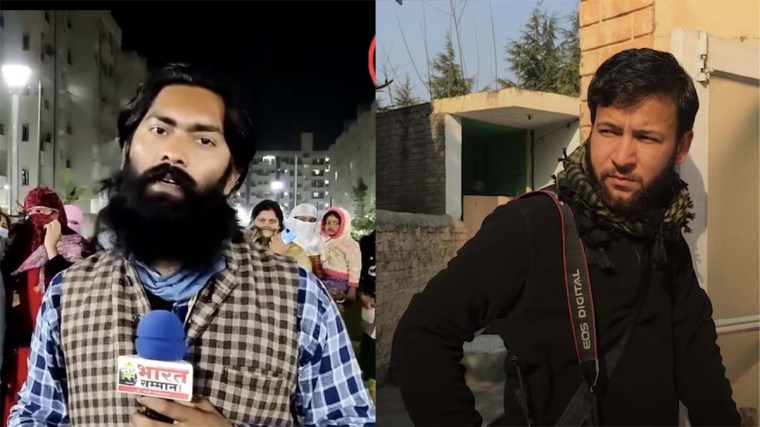New Delhi, January 11, 2022 – Authorities in Indian-administered Jammu and Kashmir and the Indian state of Chhattisgarh must immediately and unconditionally release journalists Sajad Gul and Jitendra Jaiswal, respectively, and drop all investigations related to their journalistic work, the Committee to Protect Journalists said today.
At approximately 10 p.m. on January 5, authorities in Jammu and Kashmir detained Sajad Gul, a freelance journalist who contributes to the privately owned news portal The Kashmir Walla, from his home in the northern Bandipora district of Kashmir in relation to a video he posted to his Twitter, according to news reports, a statement by the Kashmir Press Club, and a person familiar with the case, who spoke to CPJ on the condition of anonymity due to fear of reprisal by authorities. The video, which has since been removed, shows women protesting the killing of a local militant commander, according to The Kashmir Walla.
On January 8, the Jammu and Kashmir police issued a statement saying Gul was arrested for allegedly provoking people to “resort to violence and disturb public peace” by posting an “objectionable” video on his social media and accused him of spreading disinformation “under the garb of a journalist,” according to those sources.
In a separate case, yesterday morning police in Raipur, the capital of central Chhattisgarh state, arrested Jitendra Jaiswal, editor of the privately owned Hindi-language local news website Bharat Samman, after he reported on a protest held shortly after midnight last night by a group of police officers’ family members regarding alleged corrupt practices in housing allotment, according to the journalist’s wife, Priya Jaiswal, who spoke to CPJ in a phone interview, and another local journalist, who spoke to CPJ on the condition of anonymity due to fear of reprisal.
Rajesh Chaudhary, deputy superintendent of the Raipur police, told CPJ via phone call that Jaiswal was arrested for violating COVID-19 restrictions by organizing the protest and had been detained in Raipur Central Jail. Priya Jaiswal denied the police’s claim and told CPJ that Jaiswal was covering the protest as a journalist.
“The arrest of two journalists in India’s Jammu and Kashmir and Chhattisgarh state for exercising fundamental rights to freedom of expression marks a disturbing start to the new year,” said Steven Butler, CPJ’s Asia program coordinator, in Washington, D.C. “Authorities must immediately release journalists Sajal Gul and Jitendra Jaiswal, drop the investigations into their work, and stop taking measures that prevent journalists from freely reporting the news.”
CPJ was not able to confirm who arrested Gul. His family asserted that the journalist was arrested by the army, according to news reports. However, in a text message to CPJ, Emron Musavi, an Indian army spokesperson, said Gul was arrested by the Jammu and Kashmir police, not the army.
Gul is currently detained in the Hajin police station, and the legal team of The Kashmir Walla filed an application for bail yesterday, according to the person familiar with the case and Fahad Shah, editor of The Kashmir Walla, who spoke to CPJ over the phone.
Police have filed a first information report, the first step of a police investigation, accusing Gul of violating three sections of the Indian penal code, which include being party to criminal conspiracy, making assertions prejudicial to national integration, and making statements with intent to cause, or which are likely to cause, fear or alarm to the public, according to news reports.
Punishment for being party to a criminal conspiracy can carry the same punishment as abetting the offense itself, according to the penal code. The other two charges carry a prison sentence of up to three years and an unspecified fine.
On February 12, 2021, Jammu and Kashmir police opened an investigation into Gul alleging that he participated in an illegal demonstration against home demolitions; the journalist told CPJ at the time that the investigation stemmed from an article he published three days prior alleging that a local government official had threatened residents of the Bandipora district and forcefully demolished their homes, as CPJ documented. Gul has repeatedly tweeted about the effect of police harassment on his mental health, work, and studies.
Zahid Malik, senior superintendent of the Bandipora police, responded to CPJ’s request for comment sent via messaging app by saying the first information report was “self-explanatory,” and a court would decide the future of the case. Dilbag Singh, the director general of the Jammu and Kashmir police, did not respond to CPJ’s request for comment sent via messaging app.
In Jaiswal’s case, Chaudhary told CPJ that Raipur police have filed a first information report against the journalist, accusing him of violating a section of the Indian penal code related to joining or continuing in any assembly of five or more persons likely to cause a disturbance of the public peace. If charged and convicted, Jaiswal could face up to six months in prison and an unspecified fine, according to the law.
Jaiswal’s lawyer Nilesh Mahobiya told CPJ via phone that a bail application was filed at Raipur lower court today, which the police have opposed. The court is expected to rule on the application tomorrow.
CPJ’s 2021 annual prison census found that seven journalists were detained in India as of December 1, 2021, setting a country record for the highest number of detained journalists since at least 1992.
